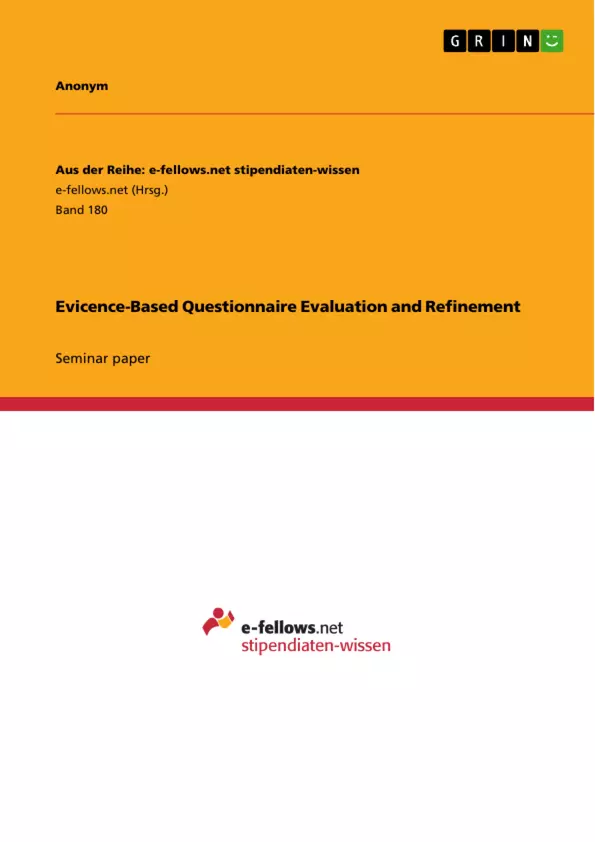The Eurobarometer (EB) is a survey series that has been conducted since 1973 to monitor public opinion on several issues concerning the European Union. It provides a dynamic measure of the EU citizens’ economic, social and political attitudes toward issues related to the EU including attitudes towards EU policies and institutions and general socio-cultural and political orientations of its citizens, based on a set of standard question over time. In addition to conducting standard EB survey, the EU also conducts special EB surveys which focus on a particular topic of interest to the EU. EB 225/Wave63.1 titled “Science and Technology, Social Values, and Services of General Interest” is one of such special surveys which addressed three special topics. One of the topics was “Social Values, Science and Technology”. In order to measure EU public’s social values in relation to science and technology, it measured social values of respondents.One indicator of social values used by the EB questionnaire was social and political attitudes which assessed the values and ethical principles of European citizens on themes such as overall satisfaction with life, their religious and spiritual beliefs and children’s upbringing. The measure of social and political attitude also included measuring educational values which were assessed on the basis of eight values - independence, obedience, hard work, sense of responsibility, imagination, tolerance and respect for other people, thrift, economizing and avoiding waste and determination, perseverance. These eight values have been used in studies that have used Kohn’s self-direction values. By self-direction it means “the capacity to take responsibility for one’s actions and that society is so constituted as to make self-direction possible; the opposite pole of this concept is conformity to external authority” (Kohn et al.,1997).
Hence, using Kohn’s theory that “child-rearing values reflect a broader set of values” (1977), and using the differentiation of Kohn’s value items into different factors provided by Yi et al. (2004), education values can be divided into two sub constructs:
1. Self-direction values with the items “Independence”, “Imagination”, “Determination/Perseverance”, “Sense of Responsibility” and 2. Conformity values with the items “Hard work”, “Obedience”, ”Thrift/ Economizing and avoiding waste”.
Inhaltsverzeichnis (Table of Contents)
- INTRODUCTION AND THEORETICAL ANALYSIS
- DATA PREPARATION
- FACTOR ANAYLSIS
Zielsetzung und Themenschwerpunkte (Objectives and Key Themes)
This research paper examines the Eurobarometer (EB) survey on public opinion in the European Union, specifically focusing on the "Social Values, Science and Technology" section. The paper utilizes a factor analysis approach to investigate the relationship between social values and educational values in the context of Kohn's theory of self-direction and conformity.
- Evaluation and refinement of questionnaire items related to social and political attitudes.
- Exploring the relationship between self-direction and conformity values within the context of educational values.
- Analyzing the structure of educational values in relation to Kohn's theory of self-direction and conformity.
- Examining the application of factor analysis to reduce data complexity and identify underlying factors.
- Comparing the results of factor analysis across different national contexts (Germany and Spain).
Zusammenfassung der Kapitel (Chapter Summaries)
- INTRODUCTION AND THEORETICAL ANALYSIS: This section provides an overview of the Eurobarometer survey and its relevance to studying social values. It introduces Kohn's theory of self-direction and conformity and explains its application to educational values. The section also reviews previous studies that have used Kohn's theory in different contexts.
- DATA PREPARATION: This section details the data preparation process for the Eurobarometer Survey 63.1, highlighting the necessary steps to ensure data quality and consistency. It discusses the screening and cleaning of the data, including the identification and handling of missing values and outliers.
- FACTOR ANAYLSIS: This section presents the methodology and results of factor analysis, focusing on the extraction and interpretation of factors related to educational values. It discusses the theoretical underpinnings of factor analysis, the selection of appropriate methods, and the interpretation of the extracted factors. It also includes a comparison of the results across Germany and Spain.
Schlüsselwörter (Keywords)
The key terms and focus topics of the text include Eurobarometer, social values, educational values, self-direction, conformity, factor analysis, data preparation, and comparative research. The paper explores the relationship between these concepts and utilizes factor analysis to uncover the underlying structure of social and educational values in the context of Kohn's theory.
Frequently Asked Questions
What is the Eurobarometer survey?
The Eurobarometer is a series of surveys conducted since 1973 to monitor public opinion on social, political, and economic issues within the European Union.
What is Kohn's theory of self-direction and conformity?
Kohn's theory suggests that child-rearing values reflect broader social values, categorized into "self-direction" (independence, responsibility) and "conformity" (obedience, hard work).
How is factor analysis used in this research?
Factor analysis is used to reduce the complexity of survey data and identify underlying dimensions (factors) that explain the relationships between different social and educational values.
What are "educational values" in the context of this study?
They include traits like independence, obedience, imagination, and sense of responsibility that parents or society consider important for children's upbringing.
Why compare results between Germany and Spain?
Comparing different national contexts helps determine if the structure of social values is universal or influenced by specific cultural and national backgrounds.
- Arbeit zitieren
- Anonym (Autor:in), 2008, Evicence-Based Questionnaire Evaluation and Refinement, München, GRIN Verlag, https://www.grin.com/document/175340



